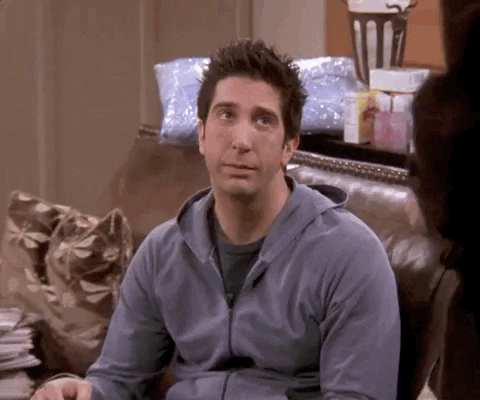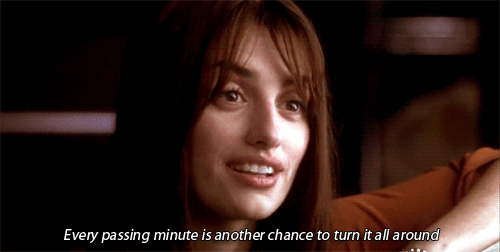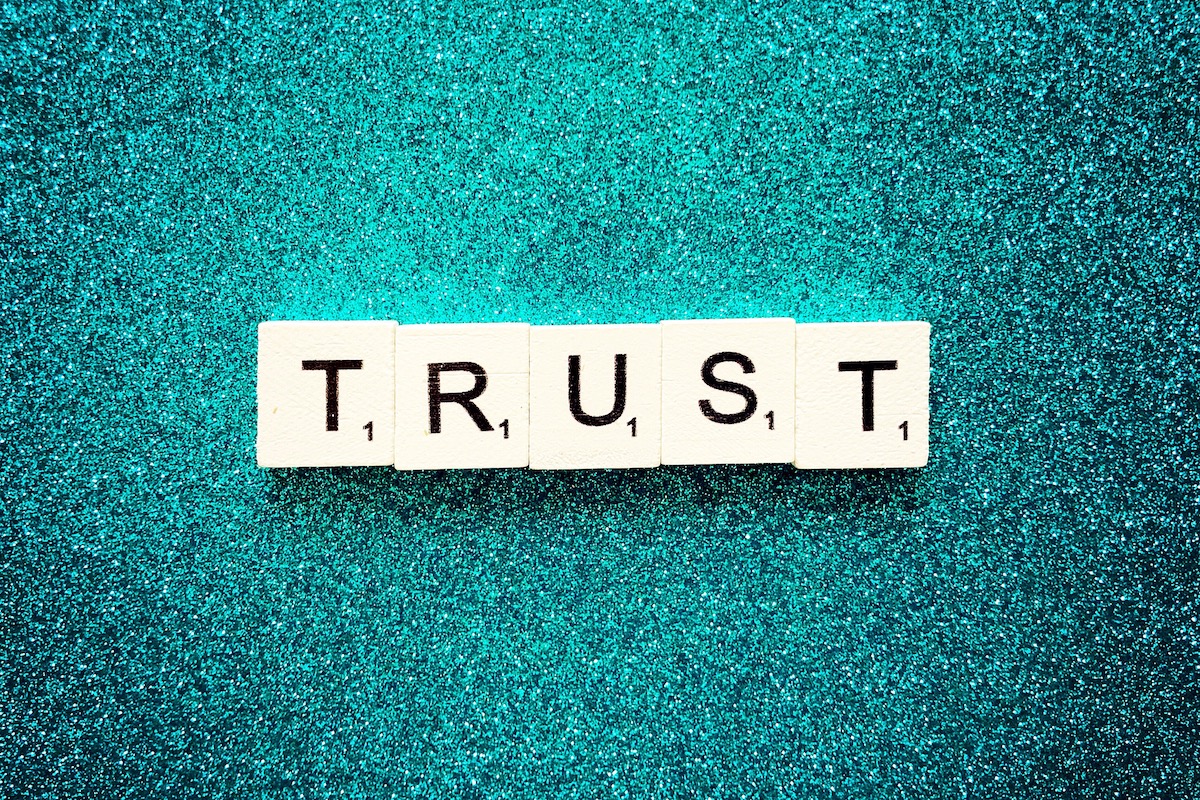Every road has its potholes, its twists and turns, and every journey has its feelings of elation and its moments of hopelessness. The road to building Man Enough has been this type of dynamic journey, a movement founded on the belief that by undefining traditional roles and traits of masculinity, men will be able to realize their potential as humans and their capacity for connection.
Continue reading10 Influential Men Transcending Masculine Style Norms (Including Kid Cudi Performing in a Dress on ‘SNL’)
Are You Man Enough to Be Trustworthy To Anyone and Everyone?
As a man, it can be frustrating, even infuriating, to be lumped in with the rest of the “usual suspects” after we do something with perfect intention. But with good reason — men don’t exactly have a lengthy track record for doing kind things, pure of heart. When it comes to motive, people often assume the worst.
So what’s in it for you? they’re thinking, eyes squinted in skepticism.
More often than not, we see men in the media who do good things for the wrong reasons, or at best, doing something helpful to society that somehow leads to personal gain. Brands whose own ads are built purely around showing consumers that they’re the “good guys” so you’ll buy their car instead of the other guy’s. A lot of the times when men do something seemingly pure of ulterior motive, the knee-jerk reaction for anyone is suspicion. Not to be trusted, and rightfully so.
Let’s put the shoe on the other foot. When you see someone, especially a person of privilege, go out of their way to help someone and you can’t find a single attachable reason other than human decency, tell us you’re not thrown for a loop like we are, especially in our social media-driven age of record-first, help-later responses.
So how do we, as men, rid ourselves of this suspicion? Frequency and universality.
Man Enough to Care
By that, we mean tipping the scale from uncommon acts of kindness to regular, recurring activities. Little things like holding the door open for someone — we’ll hold a door for someone 100 yards away, we love it — or bolder acts like going well out of your way, completely unprovoked, to check in on someone, buy someone flowers who just celebrated a major achievement, send meals to a distant friend who just had their first kid, anything for anyone who looks like they can use a hand. Or even a simple “hello” to a perfect stranger passing by.
PREORDER JUSTIN BALDONI’S BOOK “UNDEFINING MY MASCULINITY
By universality, we mean don’t just be of service to beautiful women or people you’re attracted to in hopes you will receive something in return. Do things for people who would never expect anything from you, as well. You see an elderly woman carrying her groceries, offer to help. You see a guy stranded on the side of the road, offer directions or the number to AAA. Become the universal friend, someone who is ready, willing and nonjudgmental for everyone they see.
Do it often, give to everyone and suddenly the trust wall begins to build, suspicious brows are lowered and we become a community that heals itself. After the year we’ve had, being of service should be something we jump into oncoming traffic to have the chance to do (don’t jump into oncoming traffic).
Leading By Example
Acts of kindness are the biggest dopamine hit, so even if you truly are being pure of motive, there’s always going to be a major plus in it. The point is to get to a place where kindness is second nature and worrying about motive falls into the rearview. By providing a good example to our sons and daughters, we free our boys of the scripts that say things like motive has to be tied to kindness, allowing them to be trustworthy. And we protect our daughters in the process, allowing them to trust more.
To see them pass that on to someone else later, well, that’s a thing of beauty. That’s the ultimate act of kindness, something that continues on and on, down through generations.
In the past, I’ve told the story about how I once saw a homeless man trying to get his cart of belongings up a curb, only to watch it tumble over. All I could do was watch, sitting there motionless with my morning coffee like an absolute pud. Historically — OK, once — reaching out to help the homeless with their belongings hasn’t fared well for me so I just continued to stare while a man, younger than me, went out of his way to help. I was so embarrassed by myself and yet proud of the young man for embarrassing me.
Ever since seeing that act of kindness, there is no hesitation from me. It’s worth it to put yourself out there for others.
Now, if your knee-jerk reaction to that is “so what,” then we both have work to do. We should all be willing to make the mistake of trying too hard to help, as opposed to not trying enough.
The Challenge
So what will you do this week to be pure of motive and completely trustworthy in the service of others? Look up from the phone and be observant to the world around you. There’s people in need everywhere you look and in so many ways. As we begin to move towards public life again, see where your helping hand, open ear or shoulder to lean on can be useful to others in need.
So what’ll it be, are you man enough to be trusted?
Preorder Justin Baldoni’s debut book, Man Enough: Undefining My Masculinity here.
Join us on Man Enough Facebook and Twitter.
Cover image: Twenty20photos (Envato Elements)
View this post on Instagram
Boys & Young Men Are Showing Their True Colors Earlier, And It’s About Time
On the road of life, we tend to feel we’re flying down the freeway on a fast track to nowhere in particular but that the possibilities are endless. There’s any number of exits and off-ramps, pitstops and points of scenery we could choose for ourselves along the way so the path (sometimes, the destination) we choose can vary quite easily.
But the last thing we’re likely to do is stop to ask for directions. Why is that?
For many young men, the road of life has historically been a narrow dirt path, rigid and worn down by generations of travelers and paved long with the treads of tradition, so deep the wheels have no choice but to follow the same grooves for fear of getting a flat or bottoming out. The path offers few guard rails and even fewer signposts to point the direction, but we continue further down the road, hoping it’ll lead us to the right place. Oftentimes, there aren’t any turnoffs to help us go back or change course, our direction becomes the one and only laid out before us, and the likelihood of winding up somewhere new and different dwindling with each bend in that proverbial road.
Although many men have followed the road as far as it goes without question, others are beginning to pull off and set up road signs to warn of sharp turns, potential mudslides and the distance to destinations ahead, knowing they’ve perhaps gone so far down this path that it’s a lifetime back to the main drag and that their time might best be used to help oncoming travelers avoid the same forks in the road.
That’s about where we are right now as men.
We are finding that the road we’ve been on isn’t exactly the smartest route to where we’re trying to get, and now many of us have pulled over with road flares and neon vests to redirect some of the young men coming up behind us. We’ve seen some of what lies ahead, and we know, for many, it’s a dead end.

Photograph: Picador
Nadim Shamma-Sourgen was recently awarded a book deal for poetry he has spent the vast majority of his life writing. The poems are astonishing in their ability to convey his emotions, even more astonishing because Nadim is only 4 years old.
Peggy Orenstein’s Boys & Sex illustrates a common thread for young boys who have struggled with the weight of masculinity because of an overly-simplified definition of it that is robbing them of their full and true potential. This strange period of quarantine, however, has sequestered boys from both bullies and expectations, giving them the space to express emotions and frustrations they’re wrestling with.
Similarly, Kimmi Berlin, 7, is learning it doesn’t have to be all Rick Flair and Ninja Turtles, that is to say, he’s learning that playing doesn’t have to be brute force and physical. Emotions like happiness or sadness don’t have to be buried deep inside for nobody to see, and that Barbie’s dreamhouse has an all-inclusive open-door policy.
More Man Enough: Creativity Can Be the Catapult From Depression to Self-Discovery
These headlines are slipping in between the cracks of all the madness in the news, but these stories aren’t astonishing; they’re long overdue. And the toxic forms of masculinity they’re subverting is not always toxic in the sense of the word we assume, like child abuse. It’s the general acceptance of subtle suppression for sweet boys who want to feel safe to have that honest outlet. It’s in making men feel ashamed for their sensitivity long before they’ve become men, but by then, it’s hard to turn the car around and double back.
Navigating this new masculinity is going to take time, but the pace at which things are changing can be a positive conductor for young men if we’re attuned to it.
For instance, this boy and his blog, Joseph and His Mistakes, shows a young man on the cusp of many major life decisions who notices red flags and warning signs already in his life, from locker room talk at the poker table to the lifted skirt of toxic masculinity, showing an impressionable kid more than his eyes should see at that (or any) age. But that’s only because we’ve kept young men in the dark for too long, only to quickly lift the veil and shove them into the world without so much as a roadmap.

Photo: rawpixel (Envato Elements)
More and more, boys are finding ways of expressing themselves in new ways to avoid the pressure of sincerity required by words. From painting and piano to the way they’re interacting at home while schools have been closed, boys are accessing the full range of emotions that many generations before have had to be exclusively selective with in the past.
If we want these victories to continue amongst young men so that they might continue to grow with a positive outlook on opening up to their truest self, then it’s the responsibility of the driver to take the right course. It might be bumpy at times, and the urge to turn back to the road everyone else is on might be tempting, but with the right person behind the wheel and enough snacks, there’s a lot of potential for a grand adventure.
You may not be a father yet, but you may be a brother, a buddy or an Uber driver. Whatever the capacity, you have the ability to help young men get from one point to the next, however small, and find their own way to where they’re going. And it’s not necessarily one even you’ve seen before. After generations of men talking down to boys instead of with them, make space for these young men to communicate ideas and promote positive creative experiences, whatever they may be.
There are no wrong routes if you wind up at the right destination. Some may take a bit longer than others, and some might involve a few highly questionable and fairly unsanitary stops, but if you follow your compass and avoid the swamps, you’ll get there.
Because on the road of life, we may miss a few exits or get spun around, but we eventually find our way. Though it never hurt to stop and ask for directions.
Think about what you can do for the young men in your life. What kind of guidance can you offer them from your own experience? Maybe some of those missed opportunities and misspent youth will serve a purpose after all.
For more ‘Man Enough’ episodes, go here.
Follow us on Facebook and Instagram. Remember tag us in your most #manenough moments!
Cover: altanaka (Envato Elements)
https://www.instagram.com/p/CCB6p7HJONs/
Are You Your Own Negative Fortune Teller? It Is Likely
We’re all guilty of playing the victim to our negative thoughts, but these days, it’s a crippling habit to be a negative fortune teller, especially if the fortune is yours and the forecast is constant rain clouds and thunderstorms.
Imagine sitting at your desk, eating some roasted almonds trying to get some sort of momentum going. First of all, imagine sitting at a desk in an office again! Crazy, right? You’re minding your own business, going about your workday when suddenly, your boss walks by. Now, normally, they might stop and ask you about your weekend, what you’re working on or why you’ve resorted to a diet purely of nuts, but on this particular day, they walk by without so much as a bit of eye contact or a simple ‘hello.’
We know what you’re thinking and we agree: Obviously, your boss hates you, you’re about to get fired, your girlfriend will quickly dump you, your toxic friends will call you a loser but not before reminding you you’re going to die alone, which will seamlessly lead to you being homeless and gathering what food you can from muster from a dumpster as you slowly wither way in the blistering cold, despite living in a fairly warm climate, wishing you had some of those almonds you took for granted to gnaw on.
OK, that actually does sound crazy. But it’s not far from the common tales we tell ourselves on a daily basis.
Big Man, Tiny Habits: Baby-Stepping Your Way to a Solid Routine
Negative fortune-telling is an unconscious interaction we have with ourselves, one that takes a tiny morsel of reality and expands it into a full-blown horror movie in our minds that we tell ourselves with unending sequel upon terrible sequel. Now, there should be some relief in reminding you that it’s only a movie, and there are no monsters under your bed, but the trouble with negative fortune-telling is that when you do it enough, some of the items from this little shop of horrors can manifest themselves into your life, which is why it needs to stop.
Negative thinking can rewire your brain in a bad way when you do it often enough, which means it’s imperative we override those with positive thoughts. But that sounds exhausting, doesn’t it? The best thing you can do is not let your mind run rampant in the first place, but how do we avoid that?
But just to be safe, let’s first break that scenario down.
Yes, maybe you do eat solely almonds to get you through too often, but the fact your boss didn’t stop to say hello could be caused by any number of reasons, most, if not all, unrelated to you and your nuts. Maybe they had a bad weekend, found out a loved one was ill, stubbed their toe in the kitchen while trying to make breakfast for their picky kids who, for some reason, want spaghetti at 7 AM. Maybe the business has been extra slow, they had too much wine with dinner last night and the fluorescent lights are making an unexpected hangover a bit worse, or maybe (just maybe) they discovered a weird fungus growing between their toes — probably athlete’s foot, easy fix — that they didn’t know was possible.
So how do we fix this (the negative thinking, not athlete’s foot)? Let’s see here…
Avoid Making It All About You (And Your Need to Be Liked)
One of the most common traits we share is our constant need to be liked. Exhibit A: social media.
When someone doesn’t praise our good work, notice our new shoes or even bother to acknowledge us, we take that as an offense and must get to the root as to why they hate our work, our style and our general existence. In reality, we’re just consumed with our neverending story, to which we have a beautifully-curated soundtrack we’ve worked very hard to keep updated. It’s not just on social media, it’s everywhere — the need to be seen.
By having a bit of empathy and realizing not everything that happens in this world is of direct consequence to the shoes we chose to wear today, we can move forward with a little less worry about the actions of others and even come out with a better understanding of what’s going on around us, rather than drifting through false oblivion. It makes us more attuned to the plight of others when we realize everyone has a story going on in their head and you are most definitely not the main character of theirs, nor are they the main character of yours.
But seriously, you have Fight Club soundtrack for, like every mood. What’s up with that?
Redirect That Anxious Energy
Most people would pay top dollar to have the kind of energy that gets wasted on needless thoughts and worry, bottled and sold like an energy drink without the need to pee every five minutes. But the funny part is you already have it in you. Maybe lay off the coffee, the ultimate illusion of energy, but otherwise, that superhuman strength is in you somewhere. And when you find it, you have to redirect it towards things that are important to you to keep it going.
What’s more important, doing rewarding work you’re proud of each day or figuring out if spending $300 on plaid loafers no one noticed was a poor judgment call or just all in your head? Not relatable? How about doing great work that makes you love who you are and what you do versus worrying all day if everyone else likes who you are? Because, fun fact, the more you like yourself, the less what others think matters and, yet, the more likely people are to appreciate someone with self-confidence.
Once you’ve decided how you want to use your mind and energy, you’ll feel space opening up for productive thoughts and you might even have some energy to bring those ideas to fruition. But if you live inside a constant fiction that has no end, you’ll find yourself living out some of those negative scenarios where you feel worthless or unworthy of anything good.
Tell Yourself Something Funny
When you catch yourself playing out these wild scenarios in your head, you can feel half-crazy. If that’s the case, we suggest having fun with our psychoses. If you’re going to tell yourself a story based on the unrelated actions of others, make it a short story (and make it humorous). Because most of our negative thoughts are unwanted traits we see in ourselves that we have to project onto others, but if the story becomes a comedy rather than a drama, it opens the door for levity and a bit of ridiculousness to snap you out of that hall of horrors.
If your boss failed to stop by your desk, it’s probably because they have a bad case of food poisoning that presented itself on the way to work, and the only receptacle available was a pair of $300 plaid loafers they were excited to show off that day.
See? Better already. Now you try.
For more ‘Man Enough’ episodes, go here.
Follow us on Facebook and Instagram. Remember tag us in your most #manenough moments!
Cover image: Photocreo (Envato Elements)
https://www.instagram.com/p/CCB6p7HJONs/
Why Is Sincerity Lost Among Men in Groups Bigger Than Two?
A heart-to-heart between two grown men seems about as rare as bears who nunchuck — it’s a thing but not a common one — mostly because of the unprecedented levels of vulnerability required from both sides. But why is it that all sincerity flies out the window the moment a third party enters the room?
No really, why is that? We have a few ideas.
Let’s say you have a friend you go way back with — we’re talking childhood buddies — someone with whom characteristics like honesty, trust and mutual respect are usually synonymous. You’ve born witness to each other’s most embarrassing moments, regretful haircuts and hardest lessons, yet you remain rocks for each other to lean on. When one of you has been dumped, goes broke, loses a loved one, the other is there to pick him up. We’ll go as far as to say you’d each help the other move (on a weekend, no less), completely voluntarily with zero incentive of beer and pizza at the end (although, we like to assume there will always be beer and pizza at the end). You’d take a bullet for the guy, and he’d do the same for you. It’s never said, but it’s common knowledge.
So when you two are rolling in the deep, mano-y-mano, about life, love and the pursuit of government support, what causes the conversation to go from open and honest to close-minded and offensive — the sweet to very sour — when just one more person, more often than not another man, enters the picture? Why is it that three’s a crowd that turns your closest pal into a guy more likely to give you a wedgy or spit in your cereal than show a sign of affection when it’s no longer just the two of you?
Let’s consider the reasons, three pillars behind insincerity and how to eradicate them.
Insecurity
It’s difficult for many men to articulate what they’re feeling. Perhaps no one in their lives has previously taken the time to open that space up, but it’s also likely most men aren’t comfortable being completely vulnerable with one another; men tend to share small bits of their feelings or keep it very surface-level. To be secure with your thoughts and feelings is to share them in their entirety, albeit with a bit of brevity to respect the listener’s time, so that someone can really understand exactly where you’re at and what you’re going through. Otherwise, what’s the point?
By showing weakness, you’re actually showing strength. That’s what it is to be man enough.

Sarcasm, similarly, is the language of the insecure, regardless if it’s intentional. It serves to convey an idea without the sincerity needed to make it effective. Instead, it comes off smug or glib and can be hard to tell if the feeling is meaningful or exactly the opposite.
To avoid insecurity, try honesty without a side of crass humor, then add a dash of eye contact. You may find it deliciously refreshing. Although satire is scientifically-proven to help change a person’s opinion or misguided beliefs, true sincerity involves eye contact and a genuine conveying of ideas. Think about it: When you talk to your buddies, are you looking them in the eye, or are you allowing sports, women, or an ice-cold beer to be that third party that takes away your focus and, thus, your sincerity?
Jealousy
When a friend opens up about major life opportunities, at work or at home, their need for your advice on the subject suddenly can become extra personal when you compare their upward trajectory to your own life’s direction. In a way, their need for your advice is its own form of insecurity, and that’s OK. Sharing this information with you is their attempt to overcome that. So while you may be excited to be helpful in that moment, it’s hard to not eventually make it about yourself later on. That comparison can breed jealousy which can then breed into bitter resentment wherein you’re not only not happy for someone you care about, now you’re eagerly awaiting them to fall.

Is it because you feel they’ll no longer need you or your advice? Any attempt to hold a friend down or keep them on your level is its own form of insanity, which is not uncommon, but certainly is not a recipe for a healthy friendship.
If you want to overcome jealousy, simply realize that another’s happiness doesn’t cost you a thing. There’s plenty to go around, especially when it’s a friend. Not everyone deserves the things they get, good or bad, but if you can’t be happy for someone close to you, who has worked hard to get where they are or has overcome massive obstacles and life changes to make it happen, that’s a red flag right there, friend.
Try to be more supportive. Support is cyclical and shouldn’t be a surprise if good support then finds its way back to you on your own path.
Hypocrisy
What does it mean to be a hypocrite of sincerity? This happens when you speak and listen sincerely in one conversation and then immediately repeat it as gossip in another conversation. When you do this, not only do you become untrustworthy with vaulted information, but you’re now using something intimate you’ve learned in order to make someone else look weak. The only thing worse is being supportive to a friend’s face in one moment and then throwing them under the bus in the next simply because another guy is around who might actually witness your kindness or respect for your friend. This, for some reason, makes you feel weak?
Because it really shouldn’t.

Hypocrisy amongst friends feels like walking through a door you know well, only to have it suddenly hit you from behind on your way out. The more you do it, the fewer people will trust your opinions or your ability to keep theirs. We’ve all been gossips at several points in time, but if that’s your default setting for where to go when you have nothing better to say, maybe just don’t say anything at all.
Keeping the Sincerity Coming
Anyone can tell you that a real friend is someone who supports you whether you’re present to defend yourself or not. A good friend will stand up for you when others bad-talk the decisions you make as if the decisions of one are suited for the rest. What worked for you at 25 might not be working at 35, and to have someone call you an “idiot” for trying to do better is no friend at all. A good friend would risk their own reputation to stand up for yours. As we get older, real friends and good men seem harder to find, so appreciate the ones you have and stand by them through thick and thin.
The next time you’re in a group of three or more and feel the air of sincerity go out of the room, keep in mind that not everyone necessarily has historically seen true sincerity that they can model nor have they necessarily gained the self-confidence they need to stay sincere (or even just kind) in their friend groups. The best thing you can do is be the first to pull it back in. If you’re persecuted for it, stay in the pocket and call it out. If it continues to happen, it’s OK to put a little distance between those people.
Because odds are they get it, and eventually they’ll come around (but maybe not). If they don’t, you keep it small and stay sincere while you enjoy all the pizza in the end.

For more ‘Man Enough’ episodes, go here.
Follow us on Facebook and Instagram. Remember tag us in your most #manenough moments!
Cover image: NBC
https://www.instagram.com/p/CCB6p7HJONs/
Big Man, Tiny Habits: Turning a Negative Into Your Motivation
Welcome to a new Man Enough segment that focuses on small shifts to your daily tiny habits that, in time, can result in massively positive changes. Whether you struggle to regularly work out or feel your vocabulary is lacking, or if there seems to be a tire around your waist from stress eating, or even if you’re just not overly excited about yourself at the moment, all it takes is the tiniest tweak of your daily routine to redirect yourself towards a more positive trajectory.
We begin with negativity, the all-consuming hate monster that follows us around like a shadow throughout the day (maybe even while we sleep). But while negativity can feel like a dark, weighty page in your story, it can actually be a good thing to have around if it’s processed in a positive way. Kind of like pasta.
Picture this: Negativity is your shadow. You know it’s there, which is good because you can easily spot it, but instead of looking at it as though it’s evil, maybe consider its potential.
If you’re busy guilting yourself for gaming or watching porn too much during quarantine — you know, the kind of where you max out your fingers and stumble out of it deathly dehydrated like you’ve been on a carnival ride all day — or if you’ve exhausting yourself with emotional eating (your muffin top has a muffin top) followed by the weighty dessert of body-shaming, you need to ask yourself: Does any of this really make me happy?
Perhaps, negativity is just what you need to refuel your fire.

After eight hours of gaming, do you feel good about yourself? You hate yourself a little, don’t you? It can create inner anger towards yourself. But that’s not all bad if that negativity is used as the spark to make a positive change, and it starts with tiny habits.
Our recent Man Enough guest, Jay Shetty, is a purpose coach and meditation master, but even he admits to gaming like a guilty guru during his stay at home. We’re all guilty of doing things we know we shouldn’t; that’s half the fun. But that doesn’t mean we should hate ourselves for it. Sometimes we do things purely because they’ve become part of our routine or a detail in the story we tell ourselves, but that can always be erased and replaced or just lightly edited.
Anger and other intense emotions bring with them an energy, even if it feels dirty, but you can channel that dirty energy and transform it by redirecting that anger towards making a positive change. Maybe instead of gaming eight hours, you game for one and then switch to something healthy. Again, tiny habits. Baby steps.
Make a game out of it. For every minute you game, do a pushup. So much of gaming is stereotyped as lazy, out-of-shape sloths, but some of the greatest minds game. If by the end of the game, you’re feeling a bit ripped, you will have used something that once created negative energy in you to make a positive impact. It’s all about discipline. Rewrite the stereotype. Look at Michael Jordan’s The Last Dance, he played head games with himself to take himself to another level. You can, too.
While everything is quiet in quarantine, we challenge you to reevaluate how you spend your time, a Marie Kondo of the soul if you will. Ask yourself if the activity — gaming, porn, midnight ice cream pints — is bringing you any actual joy or if you do it because there’s nothing else to do or it’s what you’ve always done.
Even healthy things are up for this debate.
If your hobbies, workout routines or even the people you were spending time with three months ago don’t make you feel good anymore, it’s time for a tweak. This is not to say you shouldn’t work out but do it in a way that’s exciting to you, something that stirs your enthusiasm. And don’t be afraid to pull from your past and do something that makes you look ridiculous if it tickles your brain or your heart inside.
Freshen things up, follow your curiosity and get excited about your life again. Rewrite the stereotype. There’s no better time than this very moment. And switch to dark chocolate; it’s healthy, dirty goodness in small doses.
For the latest Man Enough episodes, go here.
Then be sure to follow us on Facebook and Instagram. Remember tag us in your most “man enough” moments!







